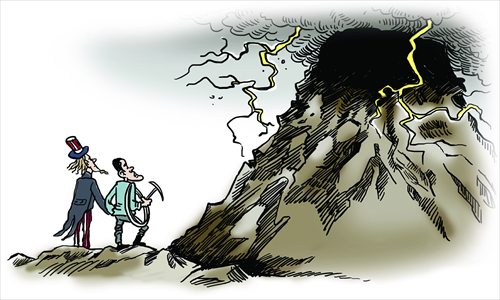Obama faces steep uphill political climb

Barack Obama has defeated Republican challenger Mitt Romney and won reelection in US presidential race, winning a slim margin in the popular vote and a substantial majority in the electoral college.
Most of the time, there are two periods when US presidents find it easier to put forward reforms. One is the first two years of their first term. The election victory is often accompanied by simultaneous victory for their party in congress, which they can maintain until midterm elections two years later. With likely control of congress, and sometimes also the senate, the passage of bills is relatively easy. Most US presidents put forward their serious reform measures during this time.
The second term is also an easier period for presidents. The 22nd amendment to the US constitution limits presidents to two terms. As a result, they may take measures that they do not dare to take in their first term. They dare to make adjustments on domestic and foreign affairs.
After being reelected, Obama made many promises during his victory speech. But his ability to fulfill them will depend on his ability to manage a Republican-dominated congress.
The upcoming congressional elections in 2014 are unlikely to see the Democrats retake control. Even their majority in the senate is not filibuster-proof. Republican obstructionism could block many of Obama's attempts at passing bills, and make his second term one marked by stalemate and frustration.
The US is facing a political dilemma, besides an economic one. Because of growing partisan politics and mutual antipathy between the White House and congress, it's hard to implement major reform. The dilemma of how to resolve the upcoming end of the Bush-era tax cuts will require major deal-making and could cause political deadlock.
Currently, a big dilemma facing the US is that politics cannot resolve economic problems. This is decided by the basic and unchangeable nature of the US political system. Because of the separation of powers, the government's abilities are limited.
But on the other hand, the US political system is extremely stable. There has been no major change for more than two centuries.
Obama's next four years will not bring great changes to the US system unless the country encounters a serious crisis.
The current crisis cannot be compared with the Great Depression (1929-39), which was a global financial crisis that left unemployment in many countries at over 20 percent and set economies back by decades.
Today's crisis is not as serious as that of the 1930s, and is not enough to produce the kind of sweeping domestic change represented by then president Franklin Roosevelt's "New Deal."
Obama has already done what he can in the last four years. All that is left to do is to consolidate the achievements he has made and to improve his foreign policies.
New methods, such as amending the tax system, cannot be achieved by the president alone without support from congress.
Obama may adjust his foreign policy toward China in his second term. To please voters, most US presidents put much pressure on China in their first term.
They take high-profile containment measures toward China when they have just taken office, and they put pressure on China when they pursue reelection.
After they enter their second term, these presidents may adjust Sino-US relations in the interests of the wider country, no longer worrying about voters.
China has already got used to Obama's thinking and approaches. Communication will be easier between the two sides, and unnecessary misunderstandings can be avoided.
Sino-US relations will get better in the next four years. This is not only because of the reelection of Obama, but also because some conflicts have already broken out in his first term.
We are already aware of these conflicts of interest and some of them have already been resolved. Overall, we can be optimistic about the prospects of Sino-US relations.
The article was compiled by Global Times reporter Shu Meng, based on an interview with Zhang Jiadong, an associate professor at the Center for American Studies of Fudan University. shumeng@globaltimes.com.cn